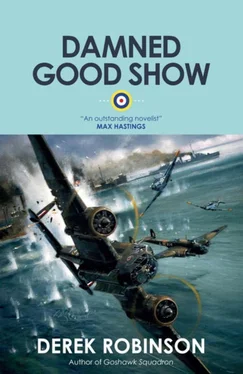McHarg had come into the barn. After a while he said: “Your orders are to return to base as soon as possible.”
“Stuff the orders,” Silk mumbled.
“Someone should stand guard. Watch out for enemy troops.”
“You’re up,” Langham said. “You do it.”
“I’m not the one who’s trying to escape. I’m just out for a wee stroll.”
“So stroll. Scarper. Go forth and multiply. Leave us in peace.”
Silk was actually asleep, and Langham was drifting out of consciousness, when a bang like a mid-air collision jerked them awake. Before their eyes could open, a brilliant blaze reached their eyeballs. They were half-dazzled as they struggled to their feet. McHarg roared, “Escape!” Silk tripped over his own feet and went sprawling. “Escape what?” Langham asked. The air stank of chemicals. “Run, you fool!” McHarg shouted. “Before you’re surrounded!” A second bang seemed to rock the barn; its stab of light showed McHarg at the door, pointing. Silk and Langham ran into the night.
McHarg caught up with them a mile away, as they lay under a tree, resting their ruined lungs.
“You’re all right now,” he said softly. “I told them you went the other way.”
“Who?” Silk asked. “And how the hell did they knew we were there?”
“Gordon Highlanders. Very clever wee soldiers.”
“Bastards.”
“Aye, probably. But cunning bastards.”
The rain was worse, and the tree gave little protection. Silk and Langham pressed on. Clay stuck to their shoes until they felt like oversized clogs. They found a lane and sat and peeled off the clay. “Which way now?” McHarg asked. For answer, Langham hurled a ball of clay, and pointed. “Wrong way,” McHarg said.
“We could kill him, Tony,” Silk said. “Beat his head in with a rock. Blame it on the brown jobs.”
“Aye. Clever wee soldiers,” Langham said.
“Only trying to help,” McHarg said.
The lane went on, and on, and then Silk saw a farmhouse. “Your turn,” he said.
A dog howled and lunged on its chain as they went up the path to the front door. “I feel an unpleasant sense of déjà vu,” Langham murmured. He used the door-knocker. They waited. Apart from the bloody dog, now trying to choke itself, the place was dead. He knocked again. Light flared at an upstairs window. It opened with a crash and a woman with a double-barreled shotgun looked out. “Stop your noise!” she shouted. “Get away from here!”
“Oh, Christ,” Silk muttered.
“Madam, we are RAF officers,” Langham called out. “Pilots. We need help. Our airplane has crashed.”
“Serve you bloody right. Bloody RAF, bloody planes over my henhouses so low I could touch the buggers, no wonder my hens don’t bloody lay, now sod off fast.”
“There’s a war on, madam. I’m sure a patriot like you—”
“You got a funny way of speakin’. You’re one of they Sixth Columnists, aren’t you?”
“You’re thinking of Fifth Columnists. I assure you—”
She fired the shotgun at the sky. “And I assure you the second barrel won’t be wasted.” She swung the gun toward them.
They ran back to the lane. “You’re in breach of the blackout regulations, you miserable old hag!” Langham shouted; but by now the window was shut.
“No luck?” McHarg said. He was eating chocolate.
“I’ve been thinking,” Silk said. “How did those explosives get into that barn?”
“Booby-trapped,” McHarg said.
“How did anyone know we’d use the barn?” Langham asked.
“Scots soldiers are clever wee bastards.”
They walked on, more slowly now because all their clothing was sodden and their wet socks were causing blisters. After half a mile they reached a railway bridge over the road, and sheltered under it. “If a car comes we ambush it,” Silk said. No car came. The tunnel trapped a cold wind.
“How is your morale?” McHarg asked. No answer. Eventually Langham sneezed, twice. “I’ll take a wee stroll,” McHarg said.
Time passed. Five minutes, ten, twenty: nobody was counting. The same appalling crack-bang! deafened and dazzled them, worse this time because the explosion was in the tunnel. The noise sent them sprawling. “Oh, sod it,” Silk said wretchedly. His brain seemed to ricochet around his skull. A second blinding blast struck them. They got up and staggered out and ran. Their lungs had been down this road before and they had no enthusiasm for it. Silk saw a gap in the hedge and he grabbed Langham’s arm. The field was black and filthy and stretched for miles, like all bloody fields. They hid behind the hedge.
McHarg slow-marched up the lane, crooning “The Skye Boat Song” in his high-pitched, childlike singing voice. Headlights appeared; a Bren-gun carrier bustled toward him and stopped. A sergeant jumped out and saluted. “Saw lights, sir. Looked like thunderflashes.”
“You mean like this?” McHarg tossed a couple of thunderflashes over the hedge. Briefly they demolished the night. “Nobody here, is there? Ah, gunpowder has a braw peppery smell… Look under the railway bridge, sergeant. That’s where they’re hiding.”
“No we’re not,” Silk said. “And we surrender.” They came out through the hole in the hedge and climbed into the Bren-gun carrier, “Hello, Tubby. Fancy meeting you here.”
“I shall never bale out,” Tubby Heckter said. “It’s exhausting.”
Everyone got back to base, one way or another, by dawn. Eight members of “B” Flight arrived first. They had seized the driver of their truck and his map-reading assistant, and spent the evening playing darts in a pub called the Goat and Compasses.
“We owe the landlord a fiver,” said the “B” Flight commander, a squadron leader called Micky Byrd. “His wife’s nephew is a cook on a Wimpy squadron, so he trusted us. Who’s winning, sir?”
Rafferty and Hunt were still playing bridge with Bins and the MO.
“Not exactly in the spirit of the exercise, was it?” Rafferty said.
“It was a democratic decision, sir. We all voted. And the two erks weren’t hurt. In fact they each ended up as pissed as a fiddler’s bitch, and I had to drive.”
“This situation was a simulated bale-out,” Hunt said. “You escaped before you were dropped. It’s not possible. It’s nonsensical.”
“Nobody said anything about that at the briefing.”
“If you come down in Germany,” Bins said, “do you think the enemy will let you capture his truck?”
“Well, at least we know how to set about it,” Byrd said defiantly.
“Three spades,” Rafferty said.
Apart from Micky Byrd’s group, nobody escaped capture. Lincolnshire—flat, wet, and thoroughly blacked out—was too much for them. Most officers were caught, usually when walking in the wrong direction. Some surrendered. Pug Duff overpowered the soldier guarding him, escaped on a horse, but was finally surrounded. A wireless op fell off a farm gate and broke an arm. At breakfast next day, Wingco Hunt said, “Well, that’s given them a taste of the real thing, Uncle.”
“Oh,” the adjutant said. “Do you really think so?”
A Mess waiter interrupted them. Hunt was wanted on the telephone. Urgently. He hurried off.
Bins said, “It’s not like you to sound skeptical.”
The adjutant chopped the head off his boiled egg. “I think I’m the only man on this squadron who’s actually baled out of an airplane. Flying display at Hendon, 1922. Fell into a tree. Cut my head. Couldn’t see for blood.”
“Bad luck.”
“Yes. Fell out of the tree, broke an ankle.”
“Oh dear.”
“Chap gave me a swig of brandy and I was sick all over his shoes. Never give brandy to a man who’s had a bash on the head, Bins. They do it all the time in films, don’t they? Not a good idea. The turn doesn’t like it. Up comes dinner. Now that’s a taste of the real thing. Frightful taste, too. So you see, last night wasn’t realistic. If those chaps had actually baled out, half of them would have ended up in trees, half in bogs, and half in hospital. Like me.”
Читать дальше












